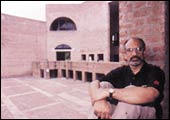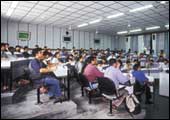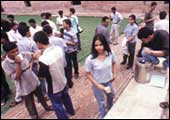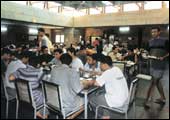 |
| Some second-year students strike a pose on
the famous Harvard steps |
It was a trial
by fire for a school that traditionally had the privilege of deciding
who would recruit from its hallowed halls. First, the economic slowdown
in the US, aggravated by the 9-11 attacks on the World Trade Centre,
made sure that there were fewer big-ticket Wall Street and consulting
firms queuing up at its Vastrapur campus. Then, just as the school
was gearing up to place its Class of 2002, Godhra happened. Placements
had to be rescheduled twice. Numbers tell the story thereon: just
36 students in a batch of 161 got overseas offers with dollar salaries;
the rest had to settle for Indian companies. In percentage terms,
that's a drop of 31 per cent. Also uncharacteristically, IIMA's
average Indian salary was lower than those of IIMB, IIMC, Faculty
of Management Studies, Delhi, and even XLRI.
Still, it's a testimony to IIMA's enduring reputation
that some of the best names in industry braved riots and their own
business constraints to come and pick students from India's pre-eminent
B-school. Lehman Brothers alone, for instance, snapped up 12 graduates.
No wonder, Jagdeep Chhokar, Dean and Director in charge of IIMA,
insists that his school continues to be among the finest globally.
"The marginal reduction in the number of investment banks and
consulting firms coming to our campus or making foreign offers was
not out of proportion to the reduction witnessed by global B-schools,"
he points out.
IIMA has traditionally been pitched as a school
for strong general management. The premise being that the need is
not so much for marketing or finance specialists as somebody who
understands an organisation in its totality and is able to improve
the quality of decision-making. Says G. Raghuram, Chairperson, PGP:
"A global recession does affect the number of companies offering
dollar-denominated salaries, but none of us feels the need for any
change in the basic parameters of the programme."
|
IIMA: SOME KEY NUMBERS
|
| Total Students |
161
|
| Average Indian Salary |
Rs 5.88 lakh
|
| Highest Indian Salary |
Rs 13.5 lakh
|
| Average Dollar Salary |
$76,421
|
| Highest Dollar Salary |
$155,000
|
| Offers per Student |
1.24
|
| Overseas Offers |
36
|
That does not mean IIMA isn't tweaking its courses
to better meet the changing business environment. For instance,
in the second year of the programme, most of the courses are electives.
Students can choose between a concentration package and an across-area
package. The number of elective courses on offer has gone up to
50, with nearly 20 additions in the last five years, and the school
is still adding. Says V.K.S Nair, Post Graduate Programme Officer:
"This year, based on student suggestions and the changing business
environment, we are considering offering elective courses in retail
marketing, business-to-business management, services marketing and
high-performance leadership under resilience in the September term.
 |
PROF. G. RAGHURAM CHAIRPERSON
OF PGP:
"Our programme is fundamentally strong" |
 |
| Quiet, please, class is progress |
The Student Factor
Last fortnight, when BT caught up with the
two-weeks-old batch taking a tea break at the Louis Kahn Plaza,
it was clear that it still considered an MBA from IIMA as the ultimate
in B-school education-recession or no recession. While the broad
mix of the students joining IIMA remains the same-most of them are
engineers, followed by graduates in commerce, arts and science-this
year there are a wee bit more it engineers. Says Girija Sharan,
admissions in charge and professor at the Centre for Management
in Agriculture: "If they had the same sense of security and
growth as what prevailed a year or two ago, they may have postponed
studying further."
Not just engineers, but doctors, chartered
accountants, and students of economics, all make up the new batch.
Students with background in medicine could be the vanguard of a
new trend: health care consultancies, or managed healthcare. Shrikant
Rajgopal, a doctor and student, explains what brought him to IIMA:
"A management degree will make it possible for me to closely
study how an organisation can be managed in its entirety, and that
includes finance, operations and HRD."
 |
| Ah, finally, a much-needed tea break at the
Louis Kahn Plaza |
 |
| After food for thought, some real food |
 |
| Watching India battle the English cricket
team at Lord's |
In some ways, the future of IIMA has never looked
brighter. The number of applications received is going up each year.
Of the 190 offers made in the current academic year, 169 students
are already in. Says Sharan: "There was not much of a difference
between acceptance ratio this year and in earlier years." Only
four candidates did not take the offers and joined other IIMs citing
reasons of frequent disturbances in Ahmedabad. But to make up, IIMA
also boasts of a student who passed up on an offer from the Richard
Ivey School of Business, University of Western Ontario.
Not just that, the "twos" (read: Class
of 2003) who were doing summer internship in India and abroad took
effort in contacting students who had been made offers and fielding
queries from parents and students-taking pains to explain that life
on the campus had not been affected by the Ahmedabad riots. Apart
from one-on-ones, there were get-togethers held in various cities.
Given the mixed bag that this year's batch
is, the placement cell is already at work. It's going to be tough
work this year too, and that's not just because of the continuing
slowdown. Some of the "ones" (read: class of 2004) are
actually looking for niche jobs like those in UN organisations,
healthcare and even construction consultancy. Says Rajkumar Subramanian,
student co-ordinator and a second-year student: "For the summer
internships, we have shortlisted some newer companies, since we
expect the regulars to cut down on their intake."
Of course, if the global economy revives-there
are some indications-IIMA will be on the roll. Once again. As usual.
1
2 3
4 5
|

